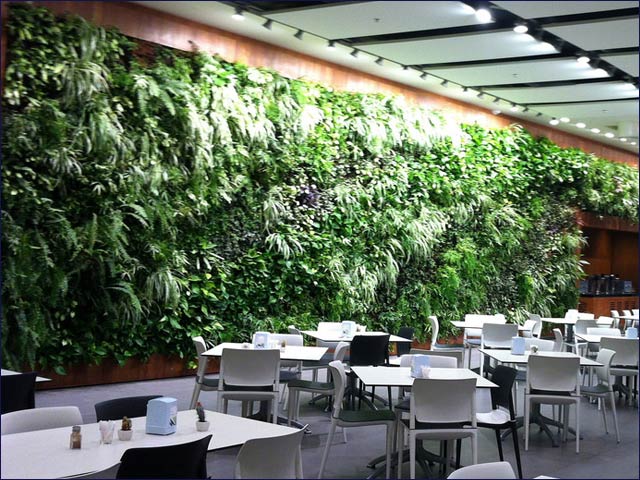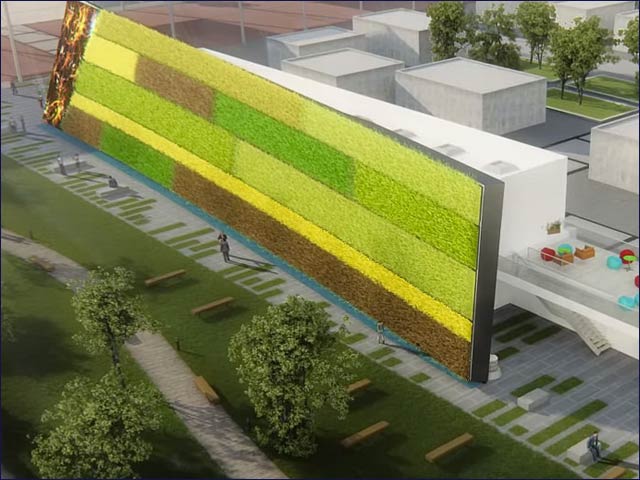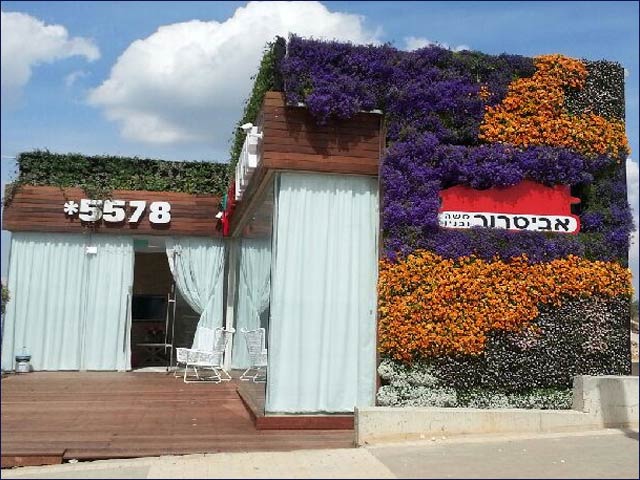Global investors see a lot of “green” in agriculture technologies of the future. As the world gradually expands to a population of eight billion people, there are business opportunities in feeding that many mouths, and doing it more sustainably. Israel as innovator is a key to unlocking the potential of earth’s limited resources and helping farmers make more money.
Israel will be building a large pavilion at the upcoming world expo, Expo Milano, to be held in Italy in May 2015, to showcase forward-thinking Israeli agriculture technology. The local Israeli company GreenWall, which specializes in vertical gardening, will be constructing a 1,000-square-meter living wall on which corn, rice and wheat are growing.

A GreenWall installation in Israel
The wall is being incubated and hatched in Israel and will be shipped to Milan in time for the expo, says company CEO Guy Barness.
Made from living plants, study construction materials and high-tech sensors, the wall will frame the Israeli pavilion of agro-tech innovation. These are Israeli companies that have been helping Israel deal with its own limitations of arable land, water and fuel. But also these are companies that have expanded outside of Israel’s horizons to feed Africa and the developed world.
While the GreenWall vertical garden seems to be a low-tech creation, it comes with thoughtful technologies — solutions that consider how to control water and the local environment of plants with roots that need to seemingly defy gravity.
This GreenWall is ornamental rather than edible
Working with local partners like Netafim and Galcon (http://www.galconc.com/), “we’ve developed a lot of technology for our GreenWall from unique fertilizers to unique pots, drippers, design and how to control the water,” says Barness.
He has built about 100 green walls in Israel already for residential urban clients on a small scale and larger walls encompassing hundreds of meters for Israeli branches of tech-savvy companies including Intel, Microsoft, Apple and Facebook.
Why vertical gardens make sense
Many of his clients request walls of ornamentals. Plants such as succulent cactuses do well in heat and with little water. Even planting vertical gardens that you can’t eat makes a lot of sense beyond the basic beauty of them, Barness explains.
Green walls buffer buildings from noise and from extreme heat or cold — about 10 degrees Celcius in either direction. In addition, they suck up local pollution, cleaning the air and acting as a carbon sink for greenhouse gas.
Barness believes that one day soon green walls and vertical gardens in cities will have an important role in supplementing the world’s food production. If produce can be grown in cities on real estate that is not currently used, people will be able to eat more locally, freshly and with fewer food transportation miles, says Barness.
And it’s also sustainable agriculture.
“We develop edible walls that you can replace as you eat them,” Barness points out.
The living walls buffer buildings from the cold
Both locals and foreigners are interested in his water-saving applications. Barness lately has been fielding business inquiries from Europe. That wasn’t the case five years ago, when he went to Europe to show them his inventions. Things have changed. Europeans and Americans are now very interested in water consumption-saving tools, and many of these solutions are coming from Israel, Barness says.
A startup farm, sí?
In addition to the agtech pavilion, Expo Milano 2015 will have another Israel-Italy connection. Three Israeli businessmen — Eran Eizik, from Oryan Business Development and Marketing, with Shimon Tal and Tzuki Deutsch from RTS Water, are working with a consortium of Israeli and Italian organizations and companies to create a startup farm, a series of installations and demo sites in Italy that will use many different innovative Israeli technologies.
This will provide a “window” into the way Israeli companies save water, increase yield and enhance environmental performance with smart agriculture, says Eizik.
Live images from the demo farm will be beamed into the Israeli pavilion at Expo Milano via video, and visitors who want to get a closer look and get their boots dirty will be able to sign up for a short field trip out to the country.
The venture, called Visitech, is still open for partner Israeli companies from the fields of agro-tech and water solutions.
An expected 20 million people are expected to visit the Expo in 2015. Will you be there seeing how Israel feeds the world?




Artículos Relacionados: